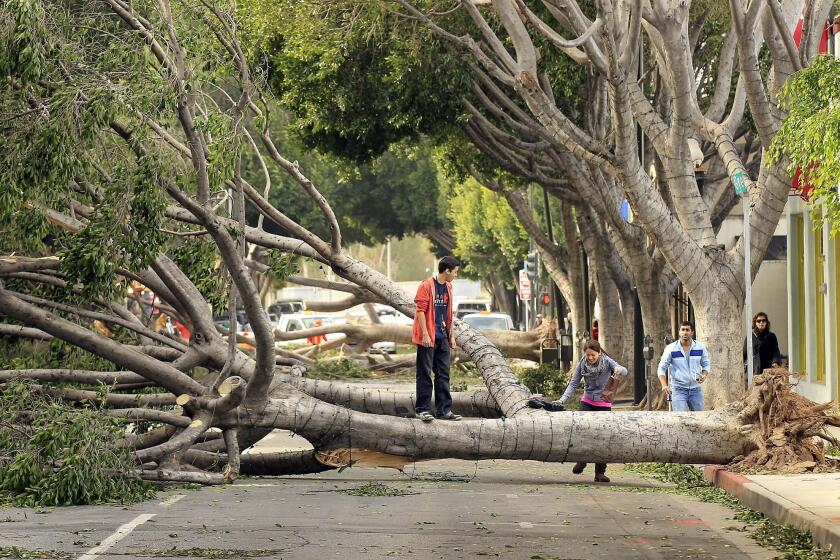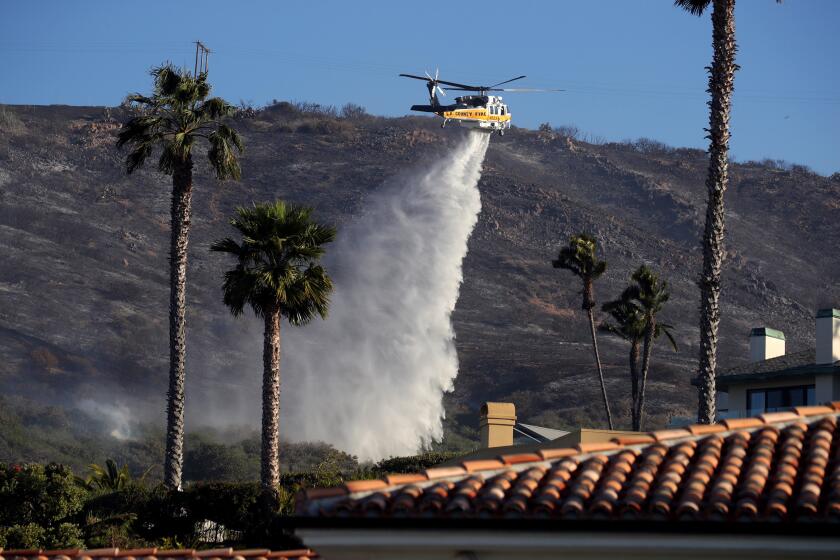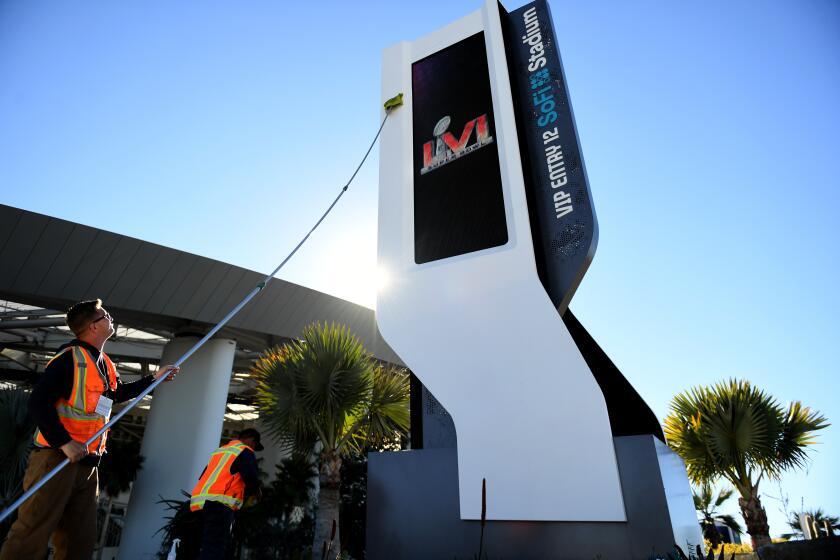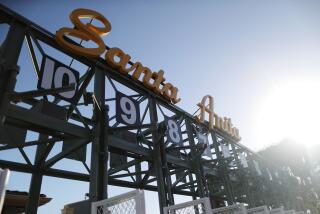Column: Forget traffic and earthquakes: The Santa Anas are the worst part of life in L.A.
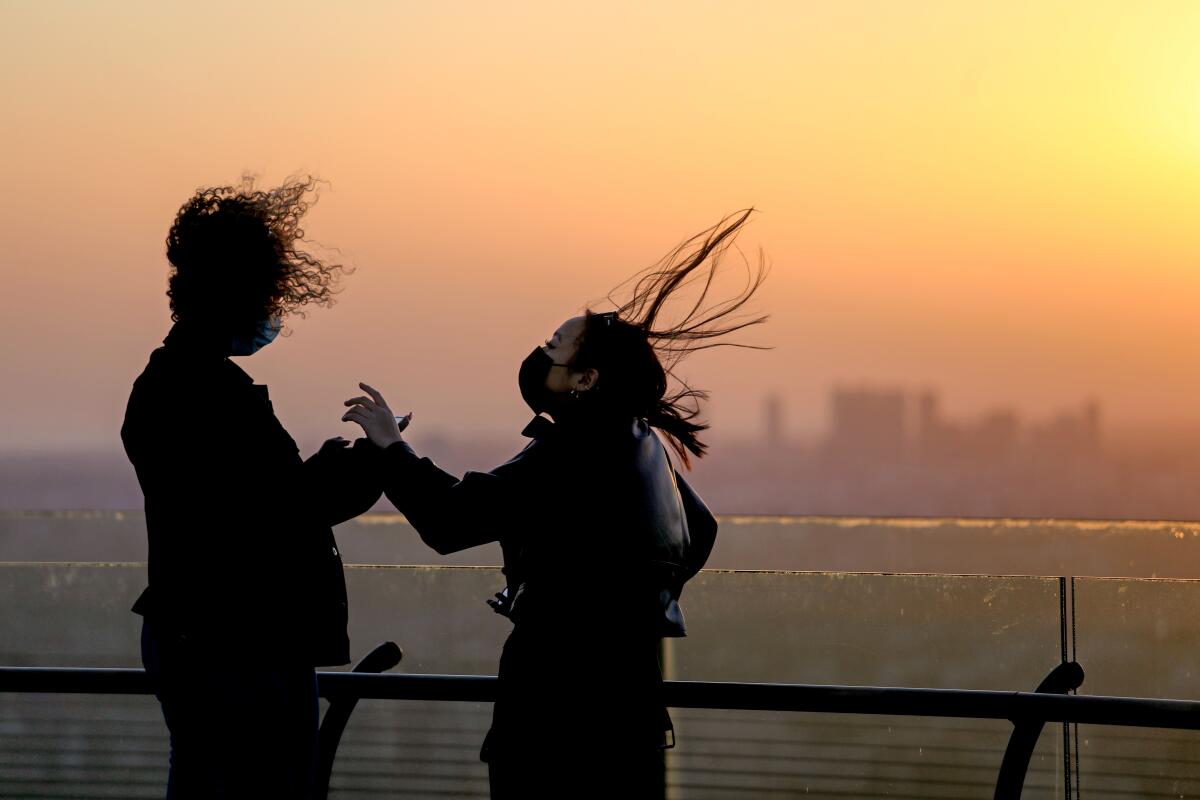
When I leave Los Angeles, if I ever leave Los Angeles, it will not be because of the traffic, the earthquakes, the absence of anything approaching a really good crab cake or even the local population’s seemingly neurological inability to RSVP for anything.
It will be because of the Santa Anas.
They are blowing right now, scattering dust and broken bits of scorching sunlight all over the place, causing my son’s nose to bleed, my head to ache and the dogs to dig a bunker in the underside of the sofa.
The Santa Anas are extreme weather without respite; I imagine this is what life would be like on Mars. You cannot bundle up or strip down to mitigate the wind. Blowing hot or cold, it yields to neither heat nor air conditioning. Windows rattle whether open or closed; and unless you live in a soundproof house, the roaring will not be denied.
Beyond the short-lived and stunning clarity of views only visible when the atmosphere has been stripped clean, the wind brings nothing but woe — broken branches, downed power lines and increased aridity in an already arid land.
This is the part when I am legally obligated to mention Raymond Chandler and Joan Didion. Both wrote famously about the Santa Anas — the former describing them as a driver of bar fights and murder, the latter as a cause of sulky maids and screaming peacocks. Both saw in the winds a metaphor for the peculiar nature of life here, a regular inescapable reminder that this is a city sprawling where no city has any natural right to sprawl.
“There was a desert wind blowing that night,” Raymond Chandler writes in the famous opening to his novella “Red Wind.”
I begrudge no one a good metaphor, and I am grateful for both Chandler and Didion’s poetic explorations of the singular nature of Los Angeles. But the Santa Anas are not so much noir as noisy. Metaphors don’t knock down trees and cause mass dehydration.
In the few but famous paragraphs she devotes to them in her essay “Notes on Los Angeles,” Didion finds connections to similar conditions in Switzerland, Austria, Israel and France; she grants these “persistent malevolent winds” not just anthropomorphic intent but near mystical abilities to trigger depression, agitation and even suicide.
There may be mythology around the Santa Anas, but there’s nothing mystical about them or their effect on the psyche. When you have crept through days nursing a migraine or trying not to choke on your own allergy-triggered snot, if your nights have been spent doing geometry to determine which of your children could be killed if that big tree finally comes down and wondering why no house in Southern California has a basement because that is where you should all be sleeping now, there’s nothing mysterious about any subsequent depression or agitation.
The Santa Anas are exhausting, and no one does well when they are exhausted.
These winds are not some weird inexplicable phenomenon like “earthquake weather.” They are a very physical assault that sucks every bit of moisture from your skin, your hair, your mouth, your nose and sometimes, or so it seems, your brain and forces you to view every tree branch, pine cone and palm frond in your vicinity with fear.
It isn’t true that no one walks in L.A. Except when the Santa Anas blow.
Two fires, one near Laguna Beach and the other near Whittier, brought harbingers of a difficult fire year for the parched region.
To give Didion her due, however, her use of “malevolent” feels particularly true this year; the timing of the winds seems ... intentional.
L.A.’s first time hosting the Super Bowl in decades is mere days away, and the weather has decided to celebrate with both a heat and wind advisory. The Santa Anas may be more noticeable inland, but they are happy to provide Inglewood with 80-degree temperatures.
In February.
On the other hand, what is ghastly for the locals, who can hear the snowpack evaporating by the minute, will no doubt be very welcome to our Cincinnati guests. (Memo to incoming Bengals fans: Pack light.)
Having recently endured two big winter storms, northeast Ohio has been coping with ice dams, which are way less fun than they sound. Ice dams occur when snow melts on the warm tops of houses and runs off the eaves, where it often freezes in curtains of ice so heavy they damage the house.
So, not as noisy as the Santa Anas but harder on the walls and floors.
Temperatures could be 20 degrees above average, with no rain forecast, thanks to an unusually strong high-pressure system over California.
Things are a bit warmer in the Cincinnati area, but its Super Bowl Sunday temperatures are projected to remain below freezing.
Whether Bengals fans find the experience of sweat in February enticing enough to consider relocating to L.A., as so many Rose Parade viewers have in the past, or just more proof that Los Angeles is basically another planet remains to be seen. Living in a state with an actual tornado season, no self-respecting Ohio resident will be bothered by the winds (though they really should watch out for flying palm fronds). Indeed, they may wonder why the locals are so darn cranky.
In which case, someone can just hand them this column.
More to Read
The complete guide to home viewing
Get Screen Gab for everything about the TV shows and streaming movies everyone’s talking about.
You may occasionally receive promotional content from the Los Angeles Times.
